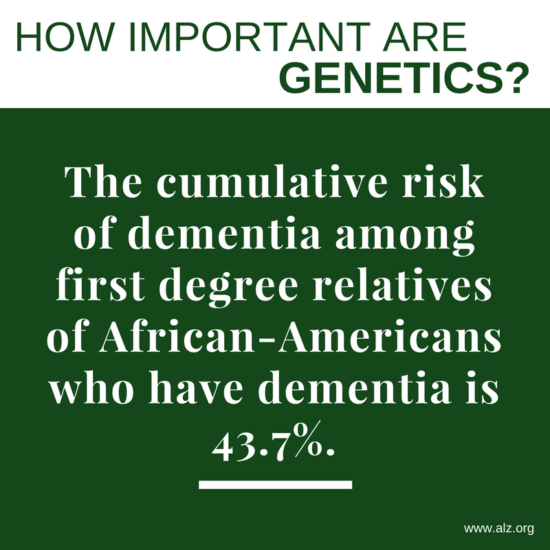Are You Up For A Fight?

Genetics
In general, there is a greater genetic risk of dementia in African-Americans. The cumulative risk of dementia among first-degree relatives of African-Americans who have dementia is 43.7%. This is a striking number but it may not be the largest risk factor (alz.org).
Environment
A person’s lifestyle has a noticeable impact on the likelihood of developing different conditions that correlate with dementia. Heart disease, hypertension, diabetes and high cholesterol can influence the risk of developing brain disease. Did you know that between the ages of 45 and 64, African American men have a 70% higher risk and Black women have a 50% greater risk of developing heart failure than Caucasian men and women? Even though African-Americans are more prone to developing forms of vascular disease, there are strategies for fighting dementia.
Lifestyle Changes
While genetics are out of our control, our daily decisions are not. Many doctors and researchers believe that by fighting vascular disease, we can fight the onset of dementia. A more active lifestyle and a healthier diet can all play an impactful role in preserving brain health. Limiting refined sugars, processed foods, saturated fats, and sodium intake are all steps in the right direction. By limiting these foods, you can prevent the buildup of toxins that can lead to inflammation which can result in impaired cognitive function. Consuming healthy fats, fresh fruits, vegetables and lean meats are known to help reduce the risk of disease.
Treatment & Care
At Summerset Assisted Living Community, our nutritionists and nursing staff follow careful dietary and activity guidelines that keep our residents healthy and strong…strong enough to fight hereditary and environmental risks associated with both heart and brain disease. Learn more about our structured programs and our Memory Lane special care program that makes Summerset a resident’s home away from home. Follow us on social media and sign-up for our blog to stay up to date.
______________________________________________________________________________
Your Home Away from Home | Located in Atlanta, Georgia, Summerset Assisted Living Community is focused on providing top quality, excellent, compassionate care for those we serve. Schedule a tour today!


